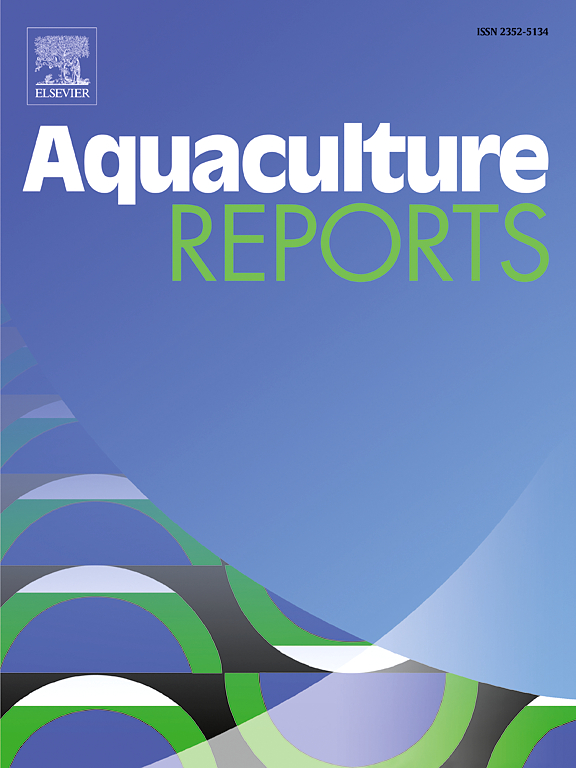Enhancing digestive and immune functions in Nile tilapia: Effects of Pediococcus acidilactici and Cordyceps militaris spent mushroom substrate extracts and their combination
IF 3.7
2区 农林科学
Q1 FISHERIES
引用次数: 0
Abstract
This study evaluated the effects of Pediococcus acidilactici and Cordyceps militaris spent mushroom substrate (SMS) extract, and their combination, on digestive function, immune responses, and gut microbiota composition in Nile tilapia (Oreochromis niloticus). Fish were fed four experimental diets (T0: control, T1: BF-CSE, T2: BF-Pa, and T3: BF-Com) for eight weeks, with three replicates per treatment. After the feeding trial, physiological, immunological, and microbial parameters were evaluated. The P. acidilactici-supplemented diet (BF-Pa: T2) significantly increased the activities of amylase, cellulase, and trypsin, indicating enhanced digestive function, although growth performance remained unchanged. The C. militaris SMS extract diet (BF-CSE: T1) improved innate immune responses, as evidenced by elevated lysozyme activity, respiratory burst, and white blood cell counts. The combined supplementation (BF-Com: T3) produced synergistic effects, significantly upregulating pro-inflammatory cytokines (IL-1β and IL-8) while maintaining stable expression of TGF-β, suggesting a robust but well-regulated immune activation. Gut microbiota analysis revealed an increased abundance of health-associated genera, including Bacillus, Pediococcus, and Cetobacterium, indicating potential prebiotic effects. These findings highlight the potential of combining probiotic and immunomodulatory components in functional feeds to enhance digestive efficiency, immune competence, and microbial stability in Nile tilapia aquaculture.
增强尼罗罗非鱼的消化和免疫功能:酸洗球球菌和蛹虫草废菌底物提取物及其组合的作用
本研究评价了酸洗球球菌和蛹虫草废菌底物(SMS)提取物及其组合对尼罗罗非鱼消化功能、免疫反应和肠道菌群组成的影响。饲喂4种试验饲料(T0:对照、T1: BF-CSE、T2: BF-Pa和T3: BF-Com),每处理3个重复,试验期8周。饲喂试验结束后,进行生理、免疫和微生物参数评价。在生长性能不变的情况下,添加P. acidilactii的饲粮(BF-Pa: T2)显著提高了淀粉酶、纤维素酶和胰蛋白酶的活性,表明消化功能增强。军棘球蚴SMS提取物日粮(BF-CSE: T1)改善了先天免疫反应,溶菌酶活性、呼吸爆发和白细胞计数均有所提高。联合补充(BF-Com: T3)可产生协同效应,显著上调促炎细胞因子(IL-1β和IL-8),同时维持TGF-β的稳定表达,表明其具有强大而调控良好的免疫激活作用。肠道菌群分析显示,与健康相关的菌属(包括芽孢杆菌、Pediococcus和Cetobacterium)的丰度增加,表明潜在的益生元效应。这些发现强调了在功能饲料中添加益生菌和免疫调节成分以提高尼罗罗非鱼养殖的消化效率、免疫能力和微生物稳定性的潜力。
本文章由计算机程序翻译,如有差异,请以英文原文为准。
求助全文
约1分钟内获得全文
求助全文
来源期刊

Aquaculture Reports
Agricultural and Biological Sciences-Animal Science and Zoology
CiteScore
5.90
自引率
8.10%
发文量
469
审稿时长
77 days
期刊介绍:
Aquaculture Reports will publish original research papers and reviews documenting outstanding science with a regional context and focus, answering the need for high quality information on novel species, systems and regions in emerging areas of aquaculture research and development, such as integrated multi-trophic aquaculture, urban aquaculture, ornamental, unfed aquaculture, offshore aquaculture and others. Papers having industry research as priority and encompassing product development research or current industry practice are encouraged.
 求助内容:
求助内容: 应助结果提醒方式:
应助结果提醒方式:


